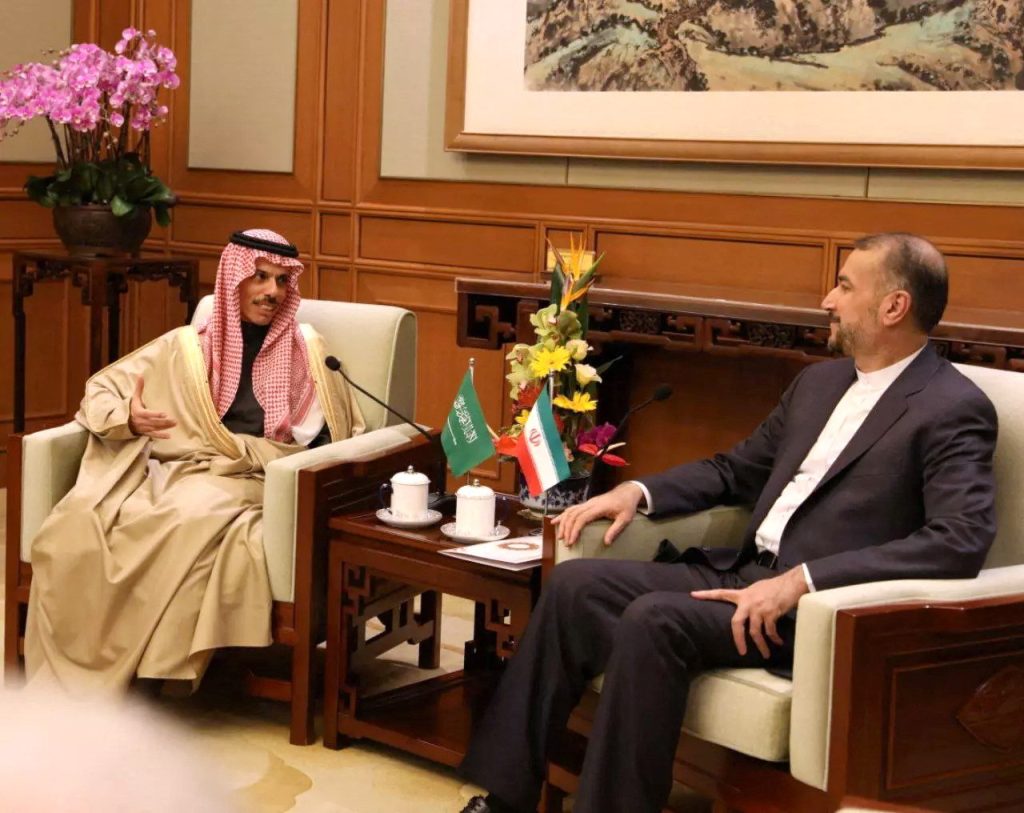 Iranian Foreign Minister Hossein Amir-Abdollahian meets with Saudi Arabia's Foreign Minister Prince Faisal bin Farhan Al Saud in Beijing, China, April 6, 2023. Iran's Foreign Ministry/WANA (West Asia News Agency)/Handout via REUTERS
Iranian Foreign Minister Hossein Amir-Abdollahian meets with Saudi Arabia's Foreign Minister Prince Faisal bin Farhan Al Saud in Beijing, China, April 6, 2023. Iran's Foreign Ministry/WANA (West Asia News Agency)/Handout via REUTERS The foreign ministers of Iran and Saudi Arabia met in Beijing on Thursday for the first formal gathering of their top diplomats in more than seven years, after China brokered a deal to restore relations between the top regional powers.
After years of hostility that fuelled conflicts across the Middle East, Iran and Saudi Arabia agreed to end their diplomatic rift and reopen diplomatic missions in a significant deal facilitated by China last month.
In brief footage broadcast on Iranian state TV, Prince Faisal bin Farhan Al Saud and his Iranian counterpart, Hossein Amirabdollahian, greeted each other before sitting down side by side.
Saudi Arabia and Iran, the Gulf’s dominant Sunni Muslim and Shi’ite Muslim powers respectively, said in a joint statement they would launch arrangements to reopen embassies and consulates within the two-month period stipulated in the deal.
“The technical teams will continue coordination to examine ways of expanding cooperation including the resumption of flights and bilateral visits of official and private sector delegations and facilitating the granting of visas for the citizens of the two countries,” they said.
In a tweet, Iran’s Amirabdollahian said the Thursday meeting with his Saudi counterpart was “positive”, adding that “the emphasis on stability and sustainable security” were among the issues agreed upon and “on the common agenda”.
In March, Chinese President Xi Jinping helped broker the surprise deal in a display of Beijing’s growing influence in the Middle East. China’s role in the breakthrough shook up dynamics in a conflict-ridden region where the United States has for decades been the main mediator.
In a meeting with the Iranian and Saudi envoys, Chinese Foreign Minister Qin Gang said Beijing supports countries in the Middle East in upholding their strategic independence, getting rid of external “interference” and keeping the region’s future in their own hands.
The detente between the Sunni kingdom and the revolutionary Shi’ite theocracy could help stabilise the Middle East, where the two sides have supported sectarian proxy forces that are either at daggers drawn or openly at war.
Regional Stability
Saudi Arabia cut ties with Iran in 2016 after its embassy in Tehran was stormed during a dispute between the two countries over Riyadh’s execution of a Shi’ite cleric.
The relationship began worsening a year earlier, after Saudi Arabia and the United Arab Emirates intervened in Yemen’s war, where the Iran-aligned Houthi movement had ousted a Saudi-backed government and taken over the capital Sanaa.
It is unclear whether the restoration of diplomatic relations could help bolster peace-making in Yemen, where Saudi Arabia has been in tough talks with the Houthis on a permanent ceasefire.
However, the rapprochement could mean improved security for Saudi Arabia as it pursues its vast Vision 2030 project to modernise and diversify its long oil-dependent economy. The kingdom has accused Iran of arming the Houthis, who launched missiles and drones at Saudi cities and oil facilities.
In 2019, Riyadh blamed an attack on Aramco oil facilities, which knocked out half of its oil output, directly on the Islamic Republic. Iran denied those accusations.
Tehran and Riyadh, according to the joint statement, underlined the importance of reviving a security pact signed in 2001, under which both sides agreed to cooperate to tackle terrorism, drug-smuggling and money-laundering, as well as a trade and technology pact from 1998.
(Reuters)
Inside Telecom provides you with an extensive list of content covering all aspects of the Tech industry. Keep an eye on our News section to stay informed and updated with our daily articles.